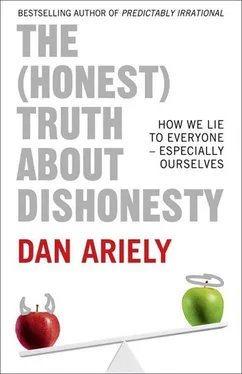Ariely, Dan - The (Honest) Truth About Dishonesty - How We Lie to Everyone – Especially Ourselves
Здесь есть возможность читать онлайн «Ariely, Dan - The (Honest) Truth About Dishonesty - How We Lie to Everyone – Especially Ourselves» весь текст электронной книги совершенно бесплатно (целиком полную версию без сокращений). В некоторых случаях можно слушать аудио, скачать через торрент в формате fb2 и присутствует краткое содержание. Жанр: Старинная литература, на английском языке. Описание произведения, (предисловие) а так же отзывы посетителей доступны на портале библиотеки ЛибКат.
- Название:The (Honest) Truth About Dishonesty: How We Lie to Everyone – Especially Ourselves
- Автор:
- Жанр:
- Год:неизвестен
- ISBN:нет данных
- Рейтинг книги:4 / 5. Голосов: 1
-
Избранное:Добавить в избранное
- Отзывы:
-
Ваша оценка:
- 80
- 1
- 2
- 3
- 4
- 5
The (Honest) Truth About Dishonesty: How We Lie to Everyone – Especially Ourselves: краткое содержание, описание и аннотация
Предлагаем к чтению аннотацию, описание, краткое содержание или предисловие (зависит от того, что написал сам автор книги «The (Honest) Truth About Dishonesty: How We Lie to Everyone – Especially Ourselves»). Если вы не нашли необходимую информацию о книге — напишите в комментариях, мы постараемся отыскать её.
The (Honest) Truth About Dishonesty: How We Lie to Everyone – Especially Ourselves — читать онлайн бесплатно полную книгу (весь текст) целиком
Ниже представлен текст книги, разбитый по страницам. Система сохранения места последней прочитанной страницы, позволяет с удобством читать онлайн бесплатно книгу «The (Honest) Truth About Dishonesty: How We Lie to Everyone – Especially Ourselves», без необходимости каждый раз заново искать на чём Вы остановились. Поставьте закладку, и сможете в любой момент перейти на страницу, на которой закончили чтение.
Интервал:
Закладка:



Dedication
To my teachers, collaborators, and students,
for making research fun and exciting.
And to all the participants who took part in our
experiments over the years—you are the engine of this
research, and I am deeply grateful for all your help.
Contents
Title Page
Dedication
Introduction
Why Is Dishonesty So Interesting?
From Enron to our own misbehaviors … A fascination with cheating … Becker’s parking problem and the birth of rational crime … Elderly volunteers and petty thieves … Why behavioral economics and dishonesty?
Chapter 1
Testing the Simple Model of Rational Crime (SMORC)
Get rich cheating … Tempting people to cheat, the measure of dishonesty … What we know versus what we think we know about dishonesty … Cheating when we can’t get caught … Market vendors, cab drivers, and cheating the blind … Fishing and tall tales … Striking a balance between truth and cheating.
Chapter 2
Fun with the Fudge Factor
Why some things are easier to steal than others … How companies pave the way for dishonesty … Token dishonesty … How pledges, commandments, honor codes, and paying with cash can support honesty … But lock your doors just the same … And a bit about religion, the IRS, and insurance companies.
Chapter 2B
Golf
Man versus himself … A four-inch lie … Whether ’tis nobler in the mind to take the mulligan … Schrödinger’s scorecard.
Chapter 3
Blinded by Our Own Motivations
Craze lines, tattoos, and how conflicts of interest distort our perception … How favors affect our choices … Why full disclosure and other policies aren’t fully effective … Imagining less conflicted compensation … Disclosure and regulation are the answers—or not.
Chapter 4
Why We Blow It When We’re Tired
Why we don’t binge in the morning … Willpower: another limited resource … Judgment on an empty stomach … How flexing our cognitive and moral muscles can make us more dishonest … Self-depletion and a rational theory of temptation.
Chapter 5
Why Wearing Fakes Makes Us Cheat More
The secret language of shoes … From ermine to Armani and the importance of signaling … Do knockoffs knock down our standards of honesty? … Can gateway fibs lead to monster lies? … When “what the hell” wreaks havoc … There’s no such thing as one little white lie Halting the downward spiral.
Chapter 6
Cheating Ourselves
Claws and peacock tails … When answer keys tell us what we already knew … Overly optimistic IQ scores … The Center for Advanced Hindsight … Being Kubrick … War heroes and sports heroes who let us down … Helping ourselves to a better self-image.
Chapter 7
Creativity and Dishonesty: We Are All Storytellers
The tales we tell ourselves and how we create stories we can believe … Why creative people are better liars … Redrawing the lines until we see what we want … When irritation spurs us onward … How thinking creatively can get us into trouble.
Chapter 8
Cheating as an Infection: How We Catch the Dishonesty Germ
Catching the cheating bug … One bad apple really does spoil the barrel (unless that apple goes to the University of Pittsburgh) … How ambiguous rules + group dynamics = cultures of cheating … A possible road to ethical health.
Chapter 9
Collaborative Cheating: Why Two Heads Aren’t Necessarily Better than One
Lessons from an ambiguous boss … All eyes are on you: observation and cheating … Working together to cheat more? … Or keeping one another in line … Cheating charitably … Building trust and taking liberties … Playing well with others.
Chapter 10
A Semioptimistic Ending: People Don’t Cheat Enough!
Cheer up! Why we should not be too depressed by this book … True crime … Cultural differences in dishonesty … Politicians or bankers, who cheats more? … How can we improve our moral health?
Nondepleting Condition
Depleting Condition
List of Collaborators
Bibliography and Additional Readings
Searchable Terms
Thanks
About the Author
Notes
Other Books by Dan Ariely
Copyright
About the Publisher
INTRODUCTION
Why Is Dishonesty So Interesting?
There’s one way to find out if a man is honest—ask him.
If he says “yes,” he is a crook.
—GROUCHO MARX
My interest in cheating was first ignited in 2002, just a few months after the collapse of Enron. I was spending the week at some technology-related conference, and one night over drinks I got to meet John Perry Barlow. I knew John as the erstwhile lyricist for the Grateful Dead, but during our chat I discovered that he had also been working as a consultant for a few companies—including Enron.
In case you weren’t paying attention in 2001, the basic story of the fall of the Wall Street darling went something like this: Through a series of creative accounting tricks—helped along by the blind eye of consultants, rating agencies, the company’s board, and the now-defunct accounting firm Arthur Andersen, Enron rose to great financial heights only to come crashing down when its actions could no longer be concealed. Stockholders lost their investments, retirement plans evaporated, thousands of employees lost their jobs, and the company went bankrupt.
While I was talking to John, I was especially interested in his description of his own wishful blindness. Even though he consulted for Enron while the company was rapidly spinning out of control, he said he hadn’t seen anything sinister going on. In fact, he had fully bought into the worldview that Enron was an innovative leader of the new economy right up until the moment the story was all over the headlines. Even more surprising, he also told me that once the information was out, he could not believe that he failed to see the signs all along. That gave me pause. Before talking to John, I assumed that the Enron disaster had basically been caused by its three sinister C-level architects (Jeffrey Skilling, Kenneth Lay, and Andrew Fastow), who together had planned and executed a large-scale accounting scheme. But here I was sitting with this guy, whom I liked and admired, who had his own story of involvement with Enron, which was one of wishful blindness—not one of deliberate dishonesty.
It was, of course, possible that John and everyone else involved with Enron were deeply corrupt, but I began to think that there may have been a different type of dishonesty at work—one that relates more to wishful blindness and is practiced by people like John, you, and me. I started wondering if the problem of dishonesty goes deeper than just a few bad apples and if this kind of wishful blindness takes place in other companies as well. *I also wondered whether my friends and I would have behaved similarly if we had been the ones consulting for Enron.
I became fascinated by the subject of cheating and dishonesty. Where does it come from? What is the human capacity for both honesty and dishonesty? And, perhaps most important, is dishonesty largely restricted to a few bad apples, or is it a more widespread problem? I realized that the answer to this last question might dramatically change how we should try to deal with dishonesty: that is, if only a few bad apples are responsible for most of the cheating in the world, we might easily be able to remedy the problem. Human resources departments could screen for cheaters during the hiring process or they could streamline the procedure for getting rid of people who prove to be dishonest over time. But if the problem is not confined to a few outliers, that would mean that anyone could behave dishonestly at work and at home—you and I included. And if we all have the potential to be somewhat criminal, it is crucially important that we first understand how dishonesty operates and then figure out ways to contain and control this aspect of our nature.
Читать дальшеИнтервал:
Закладка:
Похожие книги на «The (Honest) Truth About Dishonesty: How We Lie to Everyone – Especially Ourselves»
Представляем Вашему вниманию похожие книги на «The (Honest) Truth About Dishonesty: How We Lie to Everyone – Especially Ourselves» списком для выбора. Мы отобрали схожую по названию и смыслу литературу в надежде предоставить читателям больше вариантов отыскать новые, интересные, ещё непрочитанные произведения.
Обсуждение, отзывы о книге «The (Honest) Truth About Dishonesty: How We Lie to Everyone – Especially Ourselves» и просто собственные мнения читателей. Оставьте ваши комментарии, напишите, что Вы думаете о произведении, его смысле или главных героях. Укажите что конкретно понравилось, а что нет, и почему Вы так считаете.












